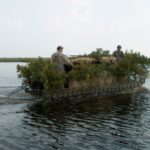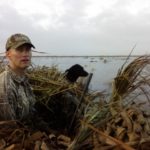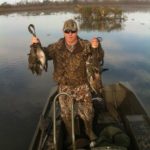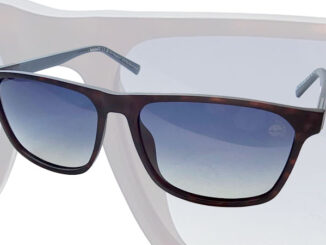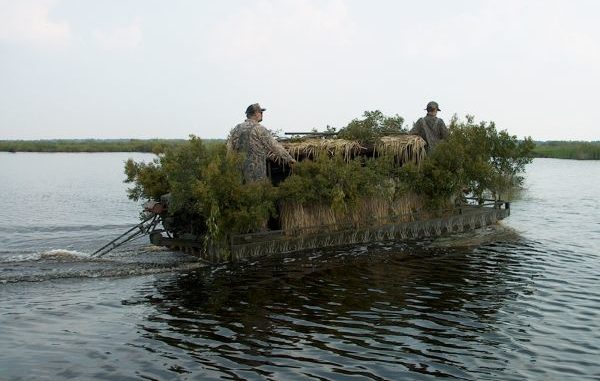
Mobility can be a duck hunter’s best friend when hunting pressure builds and birds get skittish. And popup boat blinds are the perfect solution.
I had never been a big fan of boat blinds, but the reality of the situation was finally beginning to settle in.
All of the duck blinds that I had spent endless days over the years constructing, brushing up and renovating on my duck leases were gone, thanks to Hurricane Katrina. I quickly concluded that I would need a new strategy for my duck blinds for the fast-approaching season.
Could a boat blind be the answer?
The art and science of building duck blinds is a never-ending quest deeply entrenched within all duck hunters, and the desire to find the perfect duck blind is a lifelong pursuit. I had considered boat blinds in the past, but always dismissed the idea due to the perception that they did not blend in well and had too high of a profile to be effective in our prairie marshlands of Southeast Louisiana.
Instead, I opted for the more-traditional approach of low-profile natural brush blinds carefully integrated into the surrounding landscape. I believed that this approach was the only way to fool educated big ducks late in the season.
I must say, the allure of hunting from a boat was compelling with its ease and convenience. There would be no need for a pirogue, or hip boots or waders, and I would also have the ability to move with the ducks and always be able to set up with a favorable wind.
With my options running out, I would soon get the chance to find out. I made a quick call to Warren Coco at Go-Devil Manufacturing, and soon had a popup blind installed on my boat and was ready for the season.
The maiden voyage with the popup blind was an interesting one, indeed, coming just a few months after Katrina. The marsh was devoid of hunters, and ducks were everywhere. The lack of hunting pressure was evident, as pintails and gray ducks poured into our setup, not even noticing the popup blind that was completely exposed due to very low-water conditions that forced us to set up 20 yards from the shoreline
It simply did not matter.
I was now starting to feel good about boat blinds and uttered some famous last words.
“I will never build another duck blind as long as I live.”
I would soon learn some hard lessons during the next season when hunting pressure returned and educated ducks began avoiding the boat blind.
The search for the perfect duck blind would continue.
Duck hunters have seen many innovations surface in recent years that have fundamentally changed the way we pursue waterfowl. The days of long paddles in the pirogue to secluded ponds over mud flats were over with the advent of shallow water drive engines, and popup boat blinds were not far behind.
The combination of being able to get into shallow water and use the boat as a blind was very appealing to dedicated waterfowlers, and the idea caught on quickly.
Some traditionalists might say that these innovations have diminished the sport and caused hunters to abandon the traditions and culture handed down from generations, but most realize that these innovations are simply additional tools that when — properly used — can lead to more success and enjoyment of the sport.
Boat blinds can be deadly when properly used, but they can also be very frustrating when used incorrectly or under the wrong conditions.
Here’s how some experts who use boat blinds on a regular basis use them to maximize their success.
Mike Smith — Champion duck caller and owner of Louisiana Marsh Guide Service
Mike Smith is a firm believer in boat blinds. He was introduced to them at a 2000 SHOT Show when Avery Outdoors was displaying its popup blind. It was then that he began using them in his guiding operation.
He and his guests immediately liked the ease and convenience of hunting from a boat blind. In 2004, Smith was in the market for a new duck boat, and Warren Coco suggested that he demo the new Go-Devil Floating Blind propelled by twin Go-Devil engines.
It was the perfect match for Smith, and he has been using it ever since.
“This boat is able to take three hunters and a guide with gear and a small pirogue,” he said. “It has a waterproof flip top, and it is brushed with natural cover to blend in.”
He said the advantages of the boats are clear.
“You can be mobile and move with the ducks,” Smith said. “Where I hunt, there are a lot of mung bushes growing on the shorelines, and the floating boat blind blends in perfectly.
“I will never go back to hunting from platform blinds.”
So why do some hunters fail to have success using boat blinds?
“The biggest problem is that some hunters do not put enough effort into properly blending the boat blind into the surroundings,” he said. “I use Avery Real Grass as a base, and then I go over it with Avery Killer Weed in the all-terrain colors and attach it to the blind using tie wraps.
“I then attach some native mung bush branches to put on the finishing touch. This combination blends in perfectly in the area I hunt.”
He went on to say that some top cover on the blind really works well.
“My guides who use popup blinds lay some cover on top of the blinds in between the hunters in the boat, creating a ‘hole” for each hunter,” Smith said. “A small mung bush or some palmetto leaves work well, especially when the wary big ducks make a high approach.”
One final tip that Smith suggests is to keep the popup blind in the up position between hunts during the season so the camo material can dry out. This will keep the blind in good condition the entire season.
Warren Coco — owner Go-Devil Manufacturing Inc.
During duck season, you will probably find Warren Coco chasing ducks near Hackberry in Cameron Parish — that is, when he is not at his manufacturing facility drawing up plans for his next design.
Coco began experimenting with prototype floating duck blinds as far back as 1990, and began selling them commercially in 2000.
His interest is simple.
“You can be mobile and move with the ducks and hunt any wind direction and any location,” Coco explained. “It opens up many new options for the duck hunter.”
Coco’s floating duck blinds are, indeed, the Cadillac of duck blinds, providing maximum comfort and protection from weather for three hunters. One model is even wheelchair accessible.
“Once you hunt from one of these blinds, you will not want to hunt from any other blind,” he said.
In addition to floating duck blinds, Coco began offering popup grass duck blinds in 2004. These blinds can attach to most boats and lay out of the way when not in use. They can be popped up in less than a minute. They can also easily be taken off the boat by removing four pins for off-season storage.
“Sales were very strong the first few years we offered these blinds, but sales have stabilized as more hunters have them,” Coco said. “They are built to last, so there is generally no need for hunters to replace them.”
Overcoming potential pitfalls isn’t very difficult, he said.
“Hunters should use additional natural cover on these blinds and spray paint the light tan grass with some darker greens, browns and black to break up the color of the grass,” Coco said. “Top cover is also recommended to remove the ‘black hole’ of the top opening in the blind that ducks see from above.”
Coco mentioned another problem with boat blinds is stability.
“We recommend that four spud-pole holders be welded on the boat and spud poles be used to hold the boat steady while hunting,” he said. “This will add greatly to the safety and enjoyment of the hunt.”
Capt. Howard Callahan — duck-hunting guide in Carnarvon
Capt. Howard Callahan now hunts almost exclusively from his boat.
“For years I hunted from permanent pit blinds which were very effective, but it was hard work putting them in and keeping them bailed out and dry,” Callahan said. “Now I almost always hunt from my Gator Trax duck boat.
“I can move around better, and it is just so easy. I am not as young as I used to be.”
However, Callahan does not use a popup blind. Instead, he brings in natural cover like roseau cane and willow tree branches, and sticks them around the boat to break up the outline of the boat. On every hunt he brings in fresh, natural cover to replenish the blind, and after a few hunts the cover is thick.
“As long as you are still when the ducks are working, you really do not need that much cover around you, just enough to breakup your outline,” he said.
On a recent hunt the ducks worked very well, especially large flocks of teal that were working the area near the Big Mar. The teal decoyed well to the large spread that included a concentration of coot dekes. Limits came fairly easy that morning, and we did not have to get out of the boat.
It was one of the easiest hunts the author had ever been on.
The proper use of boat blinds should be a part of every duck hunter’s “bag of tricks.” While no single element of duck hunting can guarantee success, implementing an amphibious assault on ducks by being mobile and properly concealed might be just what’s needed to bring home those elusive limits this season.
Contact Information
Louisiana Marsh Guide Service
http://www.laduckhunts.com
(504) 682-1966 or (504) 228-4506 (Cell)
Go-Devil Manufacturing, Inc.
www.godevil.com
1-888-490-3254 (Toll Free)
Capt. Howard Callahan
(985) 807-6323
Capt. Steve Himel
www.marshland-adventures.com
(504) 458-8737
Expert boat-blind tips
Popup boat blinds are great tools for duck hunters looking to attract more ducks into shooting range, but there are some tricks that will maximize their hunting success.
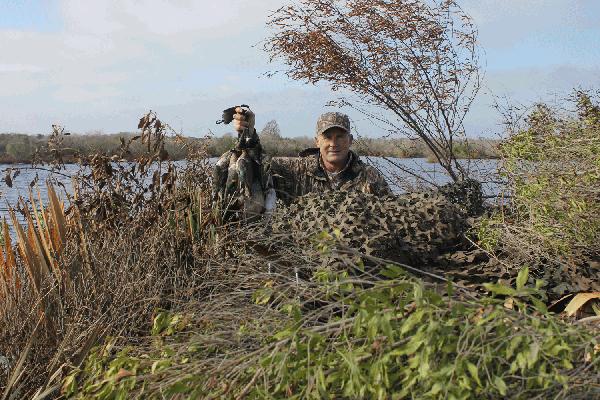 Here are some tips from expert boat-blind hunters:
Here are some tips from expert boat-blind hunters:
- Attach additional natural cover to the boat blind, but don’t use it straight out of the box.
- Spray-paint blind grass green, brown and black shades
- Move with the ducks to new areas attracting ducks
- Always set up with the wind to your back
- Secure boat with spud poles or other method for safety
- Place natural top cover
- Use large decoy spreads
- Use motion decoys
- Build drive-in boat blinds
- Bring in fresh, natural cover on every hunt
- Store your boat blind in the up position
Drive-in shooting
In addition to portable boat blinds, other hunters use permanent drive-in boat blinds.
While these blinds lack the mobility of portable boat blinds, they can still provide the ease and convenience of hunting from a boat, and more attention can be given to camouflage and cover.
One passionate duck hunter, who uses drive-in boat blinds exclusively is Jeff Vanardo, a Hammond resident who hunts near Lake Lery in St. Bernard Parish.
Vanardo loves to duck hunt, and last year hunted 44 days of the 60 day season. He has taken the art of permanent drive-in boat blinds to the extreme. Vanardo was almost giddy talking about the blinds he has built — especially “the Condo.”
“My goal with these blinds was to create a natural-looking island that looks just like all the other islands around,” he said.
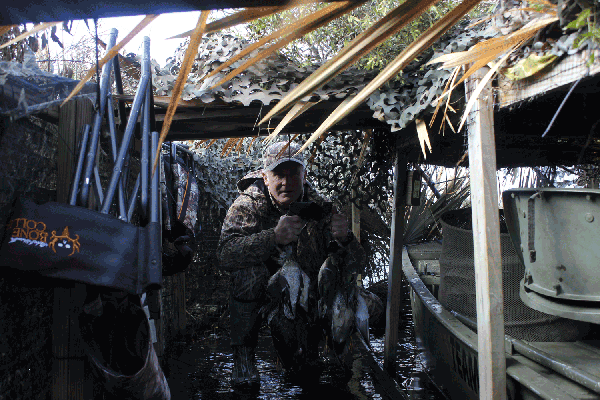
His island drive-in blind houses his boat and includes a 17-foot long platform with three openings for hunters to shoot from, chairs, dog platform, interior lighting and even a duck counter to keep track of how many ducks are down.
In addition to his Condo, he has constructed several other, less-elaborate drive-in blinds for various wind and water level conditions.
“I use between 100 and 125 decoys of various species that we shoot,” he said of his setup. “I also use two motion decoys: It is important to get the ducks eyes off of the blind and looking at the spread.”
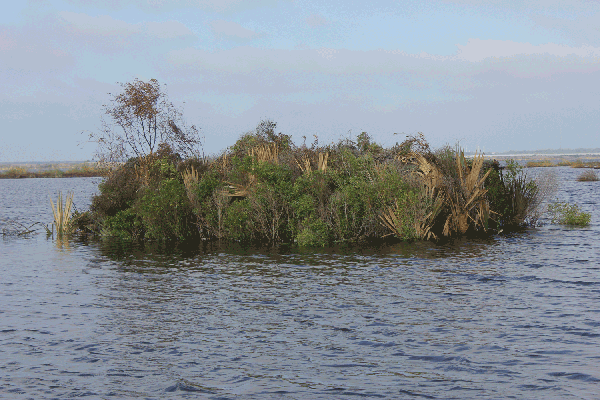 This must be working because Jeff and his guests took more than 500 ducks last season, most of them from the Condo.
This must be working because Jeff and his guests took more than 500 ducks last season, most of them from the Condo.
The author accompanied Vanardo on a recent hunt and the ducks did not seem to flair from the blind.
“I think that the ducks think the blind is just another island,” Vanardo explained. “As long as you are still when the ducks are approaching, they do not seem to even notice the blind.”
